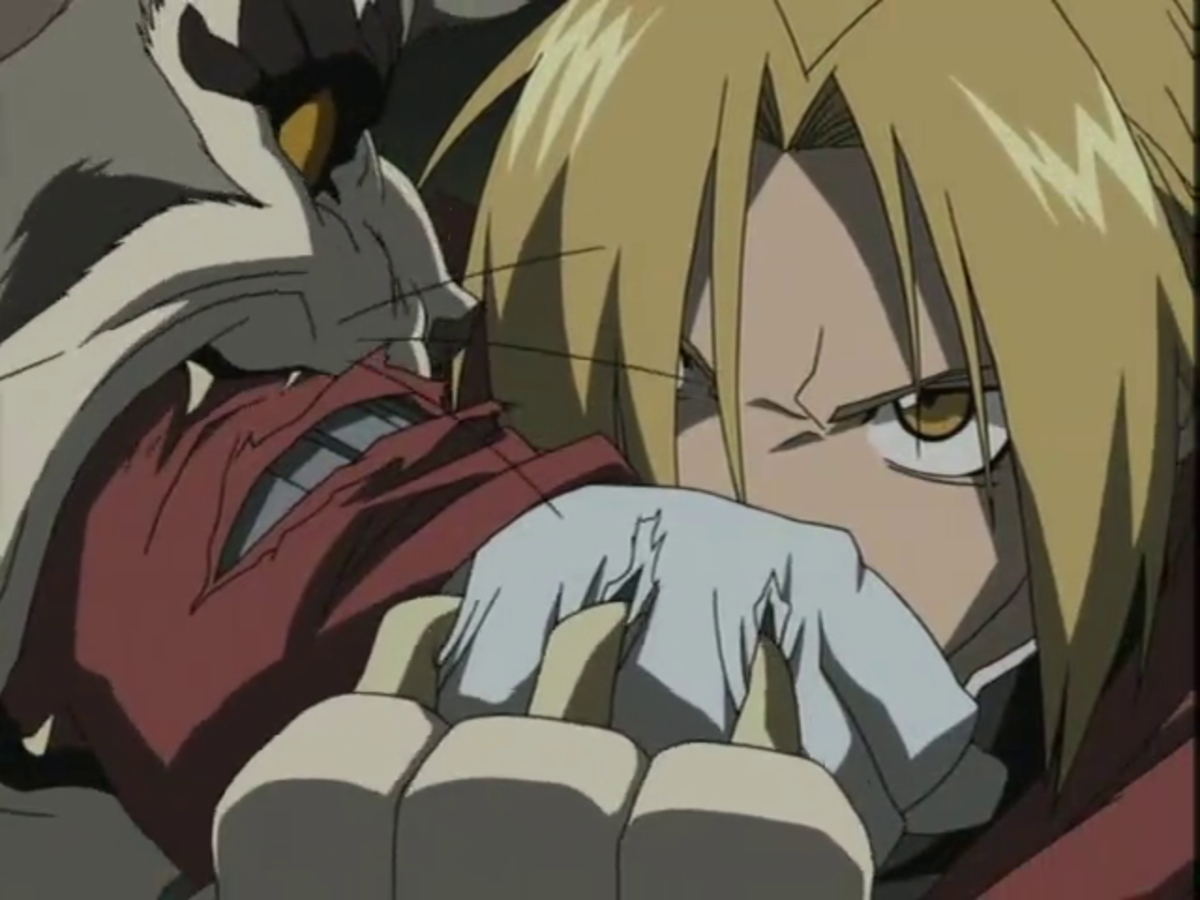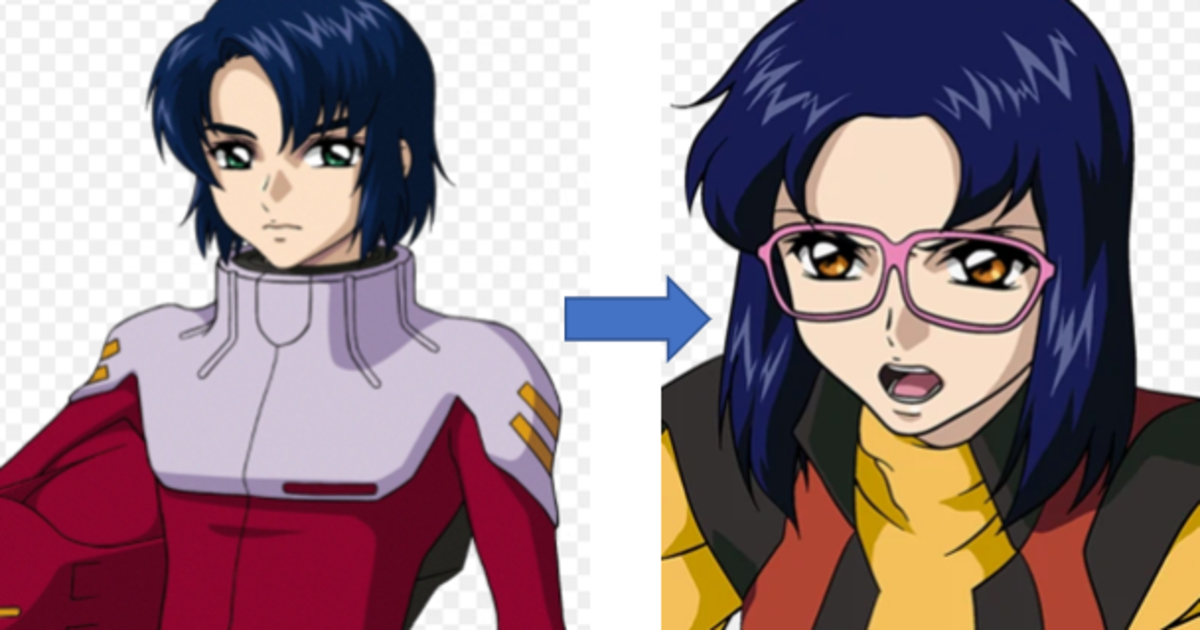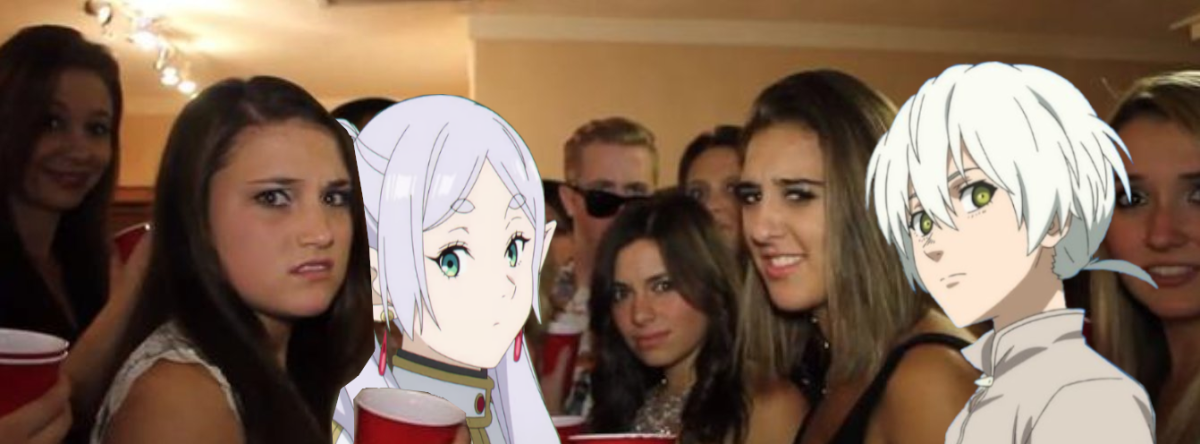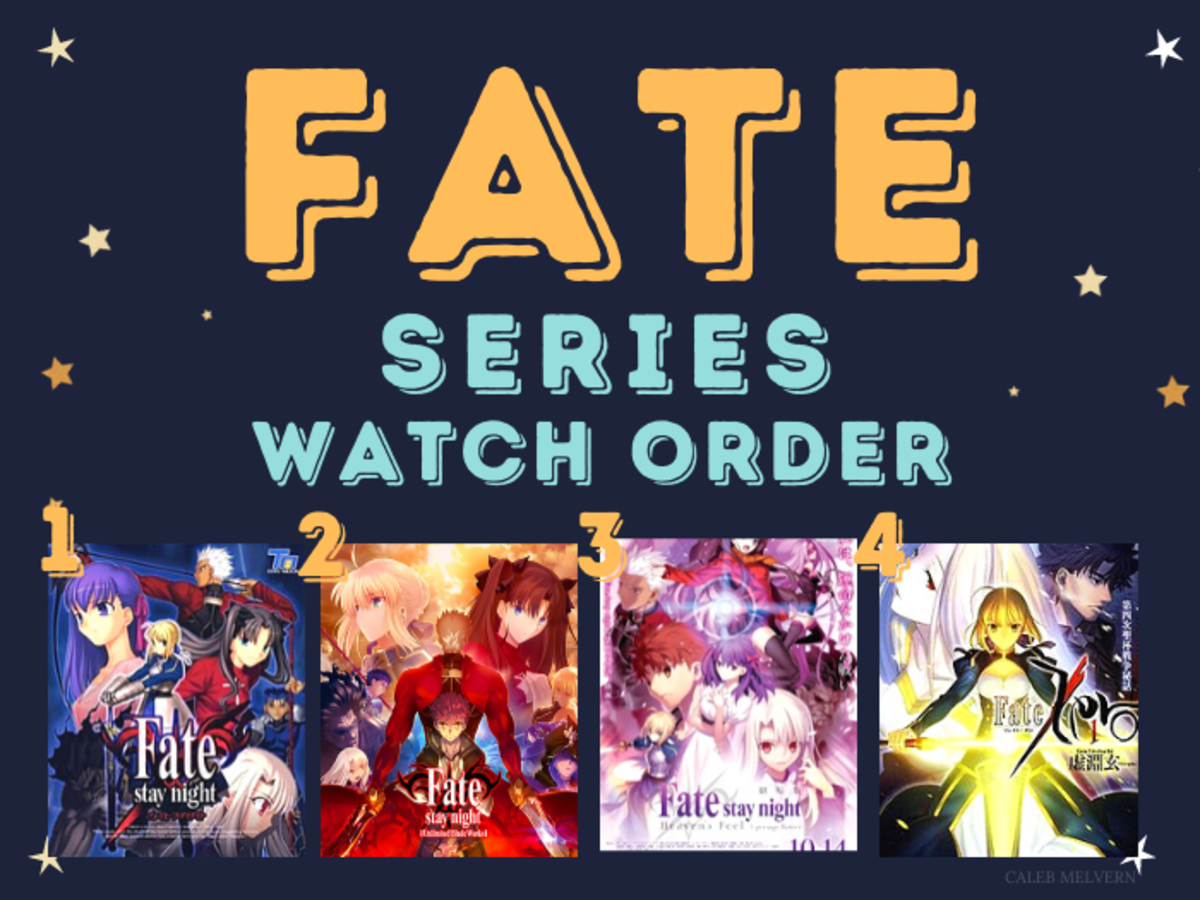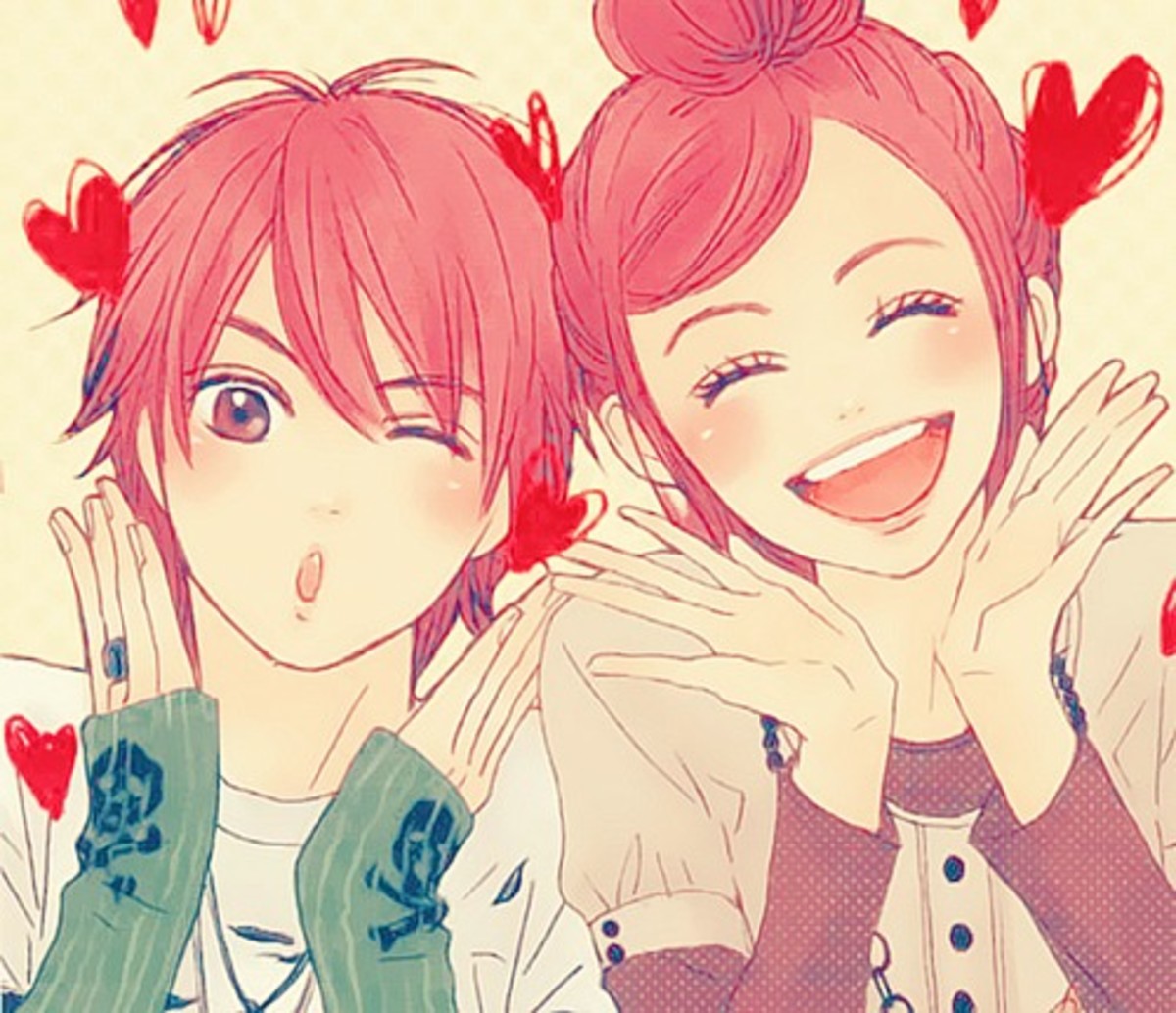Ginga Eiyuu Densetsu (Legend of the Galactic Heroes) Anime Review
If you were to ask someone what they think (objectively) is the greatest anime of all time, chances are that they would tell you that it's Ginga Eiyuu Densetsu, regardless of whether not they've actually seen it. The series has garnered an iconic reputation due to its immense amount of characters, lengthy running time, the fact of it not having any otaku culture influences and having no references to Japanese culture or language (which is ironic because Japanese is the only language that the show has audio for). But the question still remains: why is it good? This is the inquiry that I sought to answer when I decided to commence my viewing of it, and I can tell you without doubt that Ginga Eiyuu Densetsu certainly deserves a positive notoriety. However, it has a number of issues that prevent me from holding it in the same esteem as its dedicated fanbase, a qualm which I hope to highlight with utmost detail.
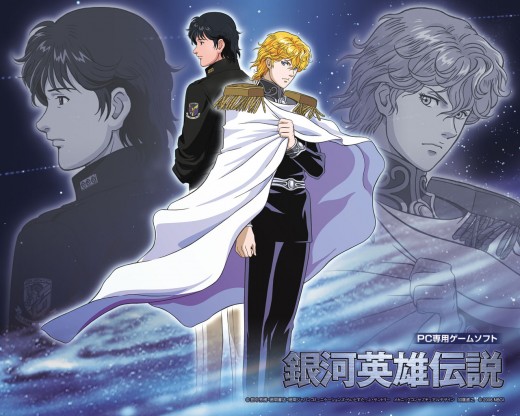
Ginga Eiyuu Densetsu is a 110-episode anime series released from 1988 to 1997 as OVAs (Original Video Animations; essentially a series that isn't aired on television, but is instead directly released for home video). The series is based on a string of 10 science fiction novels written by Tokuma Shoten from 1982 to 1987. It's known as Legend of the Galactic Heroes in English and there's also an official German title devised by the creators, called Heldensagen Vom Kosmosinsel. The development and release for the anime was done in four installments, as noted in the table below. The animation for the series was a collaborative work, as it was done by the Artland, Magic Bus, and Madhouse studios. The story follows a war in the distant future occurring between two nations with wildly differing ideals. More specifically, it tales the rise to power of two military personnel, Yang Wen-li and Reinhard von Lohengramm, each of whom originate on opposite sides of the conflict.
Seasonal information for Ginga Eiyuu Densetsu
Season
| Episodes
| Studios
| Years released
| Novel volumes adapted
|
|---|---|---|---|---|
1
| 1-26
| Madhouse, Artland, Magic Bus
| 1988-1989
| 1-2
|
2
| 27-54
| Artland, Magic Bus
| 1991-1992
| 3-5
|
3
| 55-86
| Artland, Magic Bus
| 1994-1995
| 6-8
|
4
| 87-110
| Artland, Magic Bus
| 1996-1997
| 9-10
|
Characters (Empire)
Ginga Eiyuu Densetsu features a sprawling cast of characters, many of which don't contribute much of anything to the overall plot. The anime conveniently places name tags next to characters whenever they are first introduced, (or re-introduced in seasons 2-4) so as to forego directly stating each character's name in the dialogue.
Reinhard von Lohengramm is one of the two main protagonists of the series. He's introduced as a new officer of the Galactic Empire, being quick to showcase his determination and high tactical knowledge on the battlefield. Having an unnerving disapproval for the current leaders of the Empire, the Goldenbaum dynasty, Reinhard plans to overthrow the government in favor of a new, more reasonable one. His intentions don't stop there. He also desires to take over the entire galaxy, an ambition which comes to define him as a character. Contrary to how most power-hungry denizens act, Reinhard possesses no aspiration to enslave others or discriminate against them based on ethical or racial background.
Despite his rational and steady behavior, he's a very emotional person who sticks to his ideals as if they mean everything to him, because he wants to be a good example to others in every possible way. Many of the aristocrats loyal to the Goldenbaum dynasty refer to him as "the blonde brat" frequently, implying their displeasure at his existence. His odd attachment to his sister, Annerose von Grünewald, proves to be harmful to his composure at times.
Siegfried Kircheis, Reinhard's right-hand man and best friend, possesses a a lot of the mindset, ideas, and personality of his cohort. This is offset by his ability to remain levelheaded and unemotional where Reinhard would be unable to. He stays extremely loyal to others he deems as worthy, but still holds his individual beliefs close and would not hesitate to defect if unpleased with his superiors. Kircheis and Annerose are the only two people that Reinhard held in high regard from an early age.
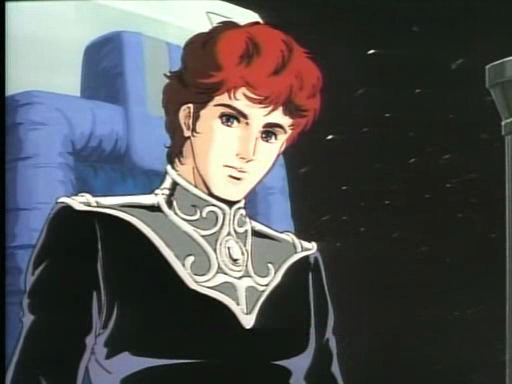
Paul von Oberstein is a man who decides to work under Reinhard. He serves to give a different view to Reinhard's glorious visions, opting for less flashy methods that ultimately are more efficient, and make more sense in the long run. Some of the other characters assert that he takes a Machiavellian approach, a notion to which I would disagree, since Oberstein has only the grandest intentions in mind, if only at the expense of his reputation. Of course, this lifestyle leaves him almost entirely devoid of emotion, making his existence suggestively pitiable.
Hildegard von Mariendorf is Reinhard's chief secretary. She doesn't exist at all until the second season, at which point she basically enters the plot out of nowhere. She often advises Reinhard on many of his endeavors, and sometimes makes better decisions or has superior ideas to his. It's apparent that Mariendorf suppresses a large amount of her thoughts and emotions from others, likely as a way to prevent herself from appearing weak.
Oskar von Reuenthal is a heterochromatic admiral who has an extensively close friendship with Wolfgang Mittermeyer. Reuenthal had a fairly unfortunate upbringing as a child, as nobody really cared about him or gave him any thought. These events shape him to be a tragic character, because he is both unaware of what will make him content with his life but also knows the makeup of substantial concepts. Being at a crossroads between the perceptions of Reinhard and Oberstein, he comes across as mindful while ruthless at the same time.
Wolfgang Mittermeyer is another admiral of the Imperial military. The main reason for his devotion to Reuenthal is not because the two have similar personalities, but rather the complete opposite. Being a lot more cheerful than most of the other Imperial characters, his presence seems like a farce at times. He also is a lot more expressive than the others, putting more emotion into his words than is typical.
Characters (Alliance & Phezzan)
The Free Planets Alliance exists as an opposition to the ideas that the Galactic Empire encompasses. Where the latter emphasizes grandiosity and autocracy, the former dedicates itself to informality and democracy. In turn, this causes many of the characters based in the Alliance to be more care-free and humorous than their adversaries.
Yang Wen-li is the second of the two main protagonists of the series. His mentality is, in many ways, similar to that of Reinhard. This is evidenced by his strong determination, along with his above-average tactical prowess and honorable behavior. This is where their similarities end. Yang appears rather unorganized and often resorts to spur-of-the-moment decisions. Also, he has an unusual interest in the study of history, and never intended to become involved in the military. This indicates that Yang is highly interested in the betterment of society and movement of things in general. He is, in a sense, a character who possesses all of the tools and knowledge to be a hero, but would definitely submit to a simpler life if someone else came to fill his shoes. His and Reinhard's success on the battleground causes both of them to find significant interest in each other, putting them at a sort of "I'm in a fight to the death with you, but I think you're great" stance.
Julian Minci is Yang's adopted son. Both of his parents died while he was at an early age, leaving him orphaned. He displays a more disciplined behavior than his mentor, as he's usually the one to keep things from becoming overly messy in the Yang household. Other than that, he stays close to the ideals and actions of Yang.
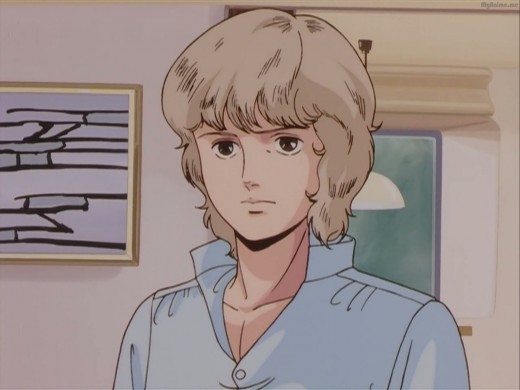
Frederica Greenhill is a woman who joined the military specifically so she could meet Yang. She was inspired by his actions when Yang was in charge of an evacuation that Frederica was involved in as a teenager. Like Julian, she follows in the footsteps of Mr. Wen-li, but still interjects her own ideas into situations when she deems it necessary.
Walter von Schenkopp is a member of the Rosenritter, a group of military members who used to be citizens of the Empire. Having an impatient and easily-waning demeanor, it's easy to see what caused him to defect to the Alliance. Schenkopp still has a keen sense of wisdom which he passes onto others occasionally, despite exhibiting objectionable behavior at times.
Schenkopp doing what he does best
Adrian Rubinsky is the leader of the small trading planet, Phezzan, that sits in between the Imperial and Alliance regions and favors neither side of the conflict. Being a rather conniving man, he would rather commit acts that contribute to his own personal gain instead of everyone's. Below this dastardly behavior, it may be possible that he longs for compassion in his life.
(Keep in mind that there are many other important characters in Ginga Eiyuu Densetsu, but I find it highly tedious and unnecessary to go over all of them, when the majority don't have more than a sentence or two to be said detailing them.)
Story
One of the main elements that sets Ginga Eiyuu Densetsu above the standard is its pacing. It manages to remain entertaining and purposeful through all 110 installments, which is something most 100+ episode shows do poorly at. Also, the events come about in a reasonable amount of time, and it's rare that more than one or two episodes is spent on a certain event, keeping things from becoming overdone or monotonous.
Then comes the story's presentation. Information is given about in an non-blatant way, as the viewer is told of the whereabouts of the setting of Ginga, its characters, and the happenstance that shapes it in due time. The only times where there are huge dumps of information (two instances in total) are done appropriately by use of visual aid. Everything else is told by simply showing the viewer what they are meant to learn. I believe that this series deserves applaud for maintaining its inclination of doing this without becoming over-zealous, and resorting to just telling everything via dialogue.
The overall essence of Ginga Eiyuu Densetsu reminds me of the works of J.R.R. Tolkien, as in, the man who wrote The Lord of the Rings and related titles. The main reason for my conjecture in this is how realistically and slowly that scenes within Ginga Eiyuu Densetsu unfold. Tolkien also developed a very detailed world with droves of backstory and characters, a complication which has also been reverberated in this series. This gives a very authentic and wide scale to the story, and this is exemplified through how the characters have to put a lot of effort into anything before it has any rippling effect, much like the real world.
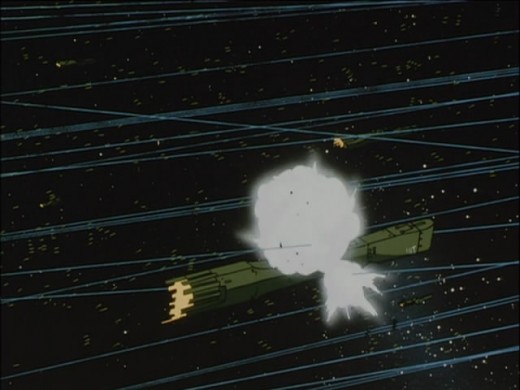
Through this set up, everything that the audience is shown has definite meaning and weight to it. Specifically with the characters, we're given more than enough backing for why a character is a certain way, and why the others around them tend to behave within certain bounds whenever in their presence. Consequentially, this makes relation with characters easy and their actions believable due to the level of immersion that these elements inhibit.
Both of the factions in the story are favored equally by the writer, who gives no reason for us to prefer either the Alliance or Empire over the other. This leads to some interesting ideas about government to be thrown about over the story's course. There is no point in which the story indicates that autocracy or democracy is inherently better than the other, a subject I found particularly enlightening, since I was taught from an early age that anything other than a republic or a democracy was evil. It's unusual to see the benefits of autocratic over democratic rule depicted in a narrative like this, it never really crossed my mind that autocratic rule could be just as effective or better than more people-oriented methods. The attention to detail also allows for some very gripping scenes, and a lot of insight into the ideas and goals of governments, including how these things come to affect the people under the governing body.
The spaceship battle sequences are another strong point. Neither side rarely ever wins by simply having some cheap advantage over the other. Instead, the fights are decided by intelligent use of tactics and management, making them a lot more involving than standard action scenes. These parts are interwoven between passages that contain mainly dialogue. The efficient switching between talking scenes and action scenes prevents things from getting dull or emitting desensitization.
Yang shows his true colors
For me, this is where the strengths of the series ends. The conversations that it has have a Rand-like feel to them. For those not in the know, Ayn Rand was an American author who wrote two highly recognized titles: Atlas Shrugged and The Fountainhead. What's significant about both of these books is how Rand went about displaying her ideas regarding basically everything within them. She did this by having many conversations in which highly stoic characters mull on about the same things redundantly. The problem with this approach is that it is unnecessarily long, while also preaching the ideas of the narrative directly without giving the audience any room to conceive their own ideas about the story. In turn, this provides for an unimaginative experience that makes the reader feel unintelligent because they are just told what they should be thinking, rather than letting them devise their own meaning based on what they're given.
This method is used to a lesser degree in Ginga Eiyuu Densetsu, but it is there regardless. It's painful having to sit through scenes where characters are mainly re-hashing things that were said countless times before. This can also shatter immersion, since characters will often verbally refer to ideas or messages more times than needed, as if they're speaking directly to the audience.
Then there is the action scenes. Although it's unique that they're won using actual tactics, this doesn't change the fact that essentially all of these scenes play out in the same way, and often overstay their welcome. It was difficult to retain my attention during these segments, with me finding it challenging to find any tension in a conflict where equal favor is placed towards both parties.
The way that schemes and plans play out also falls subject to tarnish. The characters usually plot against each other by doing something along the lines of: "oh, I'll do something that makes them think this thing so that they do this." Every time this happens, the receiving end (almost) always deciphers exactly what the other was trying to do, to the point at which it makes things ridiculously dull due to the absence of any situational or dramatic irony.
Having ultimately unfulfilling characters is another blemish that crops up along the surface of Ginga. The characters themselves (at least the most important ones) have a lot of detail and personality to them, but it never seemed like any of them received a fitting conclusion. What I mean by this is, they have a lot to them and there's definitely some emotional moments, but there aren't any clues entailing exactly what any of them were supposed to mean or what we were meant to get from them. In a way, this is gone about in the exact opposite way of everything else, as if the show doesn't care about the expression of emotion.
For example, there's quite a few dramatic scenes where important characters die. The execution of these instances themselves are tantalizing, seeing as we're given no lasting impact represented in the friends of the deceased, making it seem like the writer knows nothing of "the five stages of grief." When this happens, the story almost completely forgets about the dead character and keeps moving along, seeming to indicate that their death meant nothing.
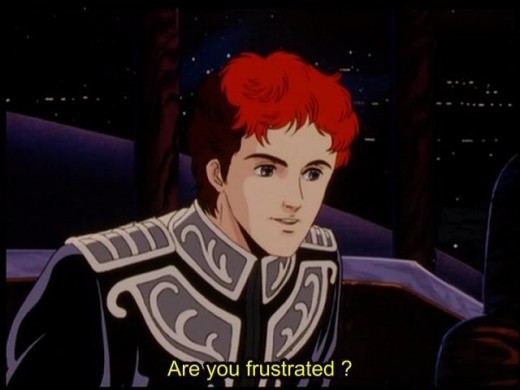
The show has a few structural and presentational errors as well. The way that the galaxy is structured doesn't make sense, (there's only two ways to get from the Empire to the Alliance in space, the place where everything can move in three dimensions with ease) and the way some of the action is presented is nonsensical. I find the infantry fights absurd because both sides just happen to use axes for one battle, while everyone has guns for another. There's no apparent rhyme or reason for either of these situations, so I'm left wondering why there's axe battles in the first place. This is due to axes being anachronistic for the setting, and also the use of them breaks up the message regarding "the monotony of war" that the large fleet skirmishes send.
There is a severe drought in the female character department. A lot of the central characters could have easily been gender-swapped, and the small amount of important women don't contribute as immensely to the story as their male counterparts. This provides next-to-nothing in the idea of "gender equality" or "eradication of gender roles" that I feel should be an important theme (or at least an acknowledgement) for any feature set in the distant future.
The most contrived element of Ginga Eiyuu Densetsu is the Earth Church. Not only does this group add ridiculousness and remove drama from the two main parties, but it could be entirely detached from the story and have little effect in the long run. Other than a few events, the Earth Church accomplishes absolutely nothing, and their existence could easily be replaced by something more in concordance with the nature of the show. Also, the way their religion is depicted is highly one-sided, with no inkling as to the benefits of religion anywhere.
The finale ended up playing out anticlimactically. We're not given anything that alludes to the main "point" that the narrative was leading up to, and things just kind of stop out of nowhere. This is all done in spite of the fact that things could have easily been tied up better, had there been at least a few more episodes. I don't see the point in providing the audience with such an intricate setup and cast of characters, if none of it was leading up to anything groundbreaking. Perhaps the source material did this better, since I've heard that the anime doesn't stick directly to it.
Animation
Some may be inclined to be uninterested in this series, mainly due to how aged the animation is. This is, by far, one of the most superficial reasons anyone would give for not viewing something, as quality in narrative is not bound by aesthetic. I'd even go so far as to say that the animation is exemplary for its time. However, I found the instances in which they "remastered" the animation at points to be distracting. These parts are detractive because the animation style suddenly changes back and forth in the same scene. Even then, I think that something that's being remastered should be done in entirety or not at all, so as to remain the highest caliber of coherence and immersion possible.
Some of the mechanisms that the characters operate are anachronistic. For example, some of the machines that are used appear a lot bigger and less streamlined than they probably should be. This can mostly be attributed to when the novels were written, seeing as Mr. Shoten had no idea how much things would change within the next 30 years alone.
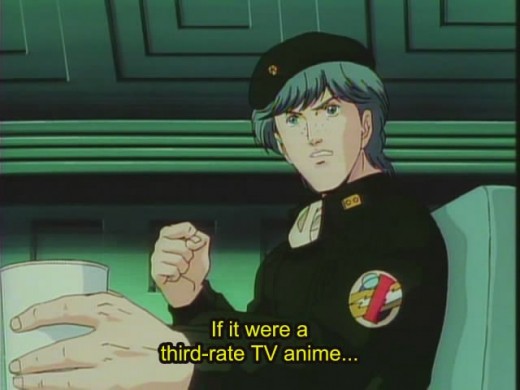
Sound
The musical score for Ginga Eiyuu Densetsu is rather fitting, opting for mostly classical music. There aren't many music styles that could illustrate the feeling and setting of this series better. However, the music loses its impact after awhile, but this is unavoidable for such a long series. The opening tracks are opera-ish tracks sung in English. Each of these openings, with the exception of the fourth one, are sung fluently, though the it's still obvious that the lyrics weren't written by a native English speaker. The voice actors are easy to distinguish by their voice, but that's all I can say about them as a non-Japanese speaker.
Conclusion
Ginga Eiyuu Densetsu is a great series that exemplifies how storytelling and setting up a fictional world should be done, and has a few interesting ideas to augment it. Contrary to this, it has some issues that prevent it from being an absolute masterpiece. For one, the repetition of dialogue and events gets boring, and there doesn't seem to be very much emotion or character fulfillment in the narrative. Also, the ending is lackluster at best, failing to accomplish what it probably should have. I'm fairly certain that the reason that this title is such a cult hit is because most of the people that actually watch it all the way through to the end loved every minute of it, and don't care about the problems I have with it. All in all, Ginga Eiyuu Densetsu is an above average series that about anyone can enjoy, as long as they don't have a problem with it being 110 episodes or with reading subtitles. Still, it is definitely not "the greatest anime ever," at least in my eyes.


